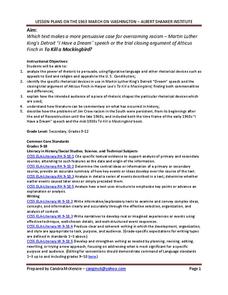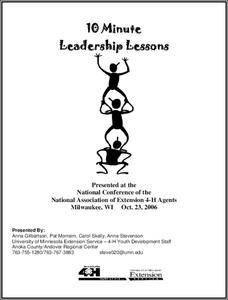Albert Shanker Institute
The March on Washington Logistics Then and Now
I have a dream ... that all pupils will be able to organize a march of their own after learning about how Bayard Rustin organized the 1963 March on Washington for civil rights. Young reformers work collaboratively examining informational...
Albert Shanker Institute
Strategizing for Freedom
Booker T. Washington, W.E.B. DuBois, Marcus Garvey, and A. Philip Randolph developed different views on how to advance civil rights for African Americans. Class members research these famous figures and their strategies before developing...
Miama-Dade County Public Schools
African Americans and the Civil War
The American Civil War is the theme of this packet of materials prepared for Black History Month. Class members learn about the roles that African Americans played during the Civil War and examine the African-American experience after...
Common Sense Media
My Online Code
Approach ethical online behavior with a series of activities geared toward teaching pupils about digital citizenship. After a brief discussion about ethics, small groups inspect a fictional social networking profile with ethics in mind....
Albert Shanker Institute
Making the Case for Equality: A Comparison
Martin Luther King Jr's " I Have a Dream" speech and Atticus Finch's closing argument during the trial of Tom Robinson both address the societal need to overcome racism. After examining the rhetorical devices and figurative language used...
Read Works
The What and Who of Elections
As citizens living in the United States, it is our civil duty to vote. But how does the voting process work? After reading a five-paragraph passage on the basics of elections and voting, young constituents respond to 10 questions based...
Memorial Hall Museum
Dedham Deed
Class members examine primary source documents that expose the contrasting views of land ownership between the Pocumtuck and English settlers.
K20 LEARN
Electoral College: Does My Vote Count?
How can a candidate get the most votes, yet still lose the race for the presidency? This is has happened more than once in American history, including in the elections of 2000 and 2016. Using an activity for creating group notes, young...
K20 LEARN
Government Power: Do the Actions of Government Effect Me?
What does the government have to do with getting a driver's license? Including the calorie count for a meal on a restaurant menu? By discussing these kinds of questions and researching how concepts behind federal, state, and local...
K20 LEARN
Bill of Rights: Do I Have a Right?
Aliens have taken over the United States! Citizens can only keep two rights laid out in the first 10 amendments of the Constitution and must figure out which ones are best. Young scholars research the importance of each amendment and key...
K20 LEARN
Identity Theft: Don't Let This Happen to Your Grandma!
Class members consider how people steal online identities as they discover the essential elements of identity theft and consumer fraud. Pupils demonstrate learning by creating a poster or video about how to avoid identity theft.
National Endowment for the Humanities
African-American Communities in the North Before the Civil War
Middle schoolers may be surprised to learn that before the American Civil War there were more slaves living in New York than there were in Kentucky! Young historians examine maps and census data to gather statistics about...
K20 LEARN
Analyzing The "I Have A Dream" Speech
The famous words of Martin Luther King still resonate with scholars today. An enlightening lesson helps pupils examine the "I Have a Dream" speech in more depth and learn what impact it had on the civil rights movement. Young historians...
K20 LEARN
Government and Your Right To Vote: Voting Rights In America
Gaining voting rights was difficult over the course of decades, but the debate over who should actually be allowed to cast a ballot remains. Scholars explore the history of the struggle, including the fifteenth and nineteenth amendments,...
K20 LEARN
Blue or Gray? Perspectives on the Civil War
Using primary and secondary sources, such as letters and diaries from soldiers and civilians, learners consider why people fought in the American Civil War. A role-playing Historical Mingle activity, as well as discussion questions and...
Center for Civic Education
Ronald Reagan and Executive Power
Article II of the United States Constitution grants Presidents executive powers in areas of international conflict, domestic and foreign policy. Using examples drawn from Ronald Reagan's presidency, class members are asked to consider...
National First Ladies' Library
Trouble in Little Rock: The Desegregation of Central High School
Middle schoolers study one aspect of the Civil Rights Movement in the United States; the battle over desegregating the public schools. They study the desegregation of Central High School in Little Rock, Arkansas by producing a newspaper,...
K20 LEARN
Plessy v. Ferguson: An Individual's Response to Oppression
After generating research questions rated to segregation, groups are given a primary source document (Jim Crow Laws, Black Codes, Plessy v. Ferguson, etc.) and craft a presentation that details the key elements of their assigned...
John F. Kennedy Center
Musical Harlem: How Is Jazz Music Reflective of the Harlem Renaissance?
Bring jazz music and the Harlem Renaissance to light with a lesson plan that challenges scholars to research and create. Pupils delve deep into information materials to identify jazz terminology, compare types of jazz and jazz musicians,...
WE Charity
Exploring the Four Leadership Styles
What is your leadership style? Tweens and teens independently complete a Four Leadership Styles worksheet. Once completed, they use a leadership code to identify their prominent leadership style. Class members gather by style, brainstorm...
Holly Middle School
Leadership 101
A four-week leadership class is designed to help scholars develop the skills they need to become effective leaders. Pupils study the habits of highly effective people and apply these concepts to leadership. They investigate paradigm...
eNet Learning
10 Minute Leadership Lessons
Forty pages offer 21 lessons to encourage leadership among kindergarten through eighth-grade scholars. Hands-on activities use the experiential learning model while exploring personal traits, getting to know peers, teambuilding,...
National Park Service
Lesson 2: Hope
There's hope in music. Pupils discover what gave enslaved people hope by examining lyrics and music during their time of bondage. A series of prompts helps individuals investigate songs of enslaved people. The cumulative assignment...
DocsTeach
The Impact of Westward Expansion on Native American Communities
Although Westward Expansion is often romanticized, its impact was devastating on Native American communities. Primary source documents, including pictures of United States troops invading indigenous lands and Native American tribes, tell...

























